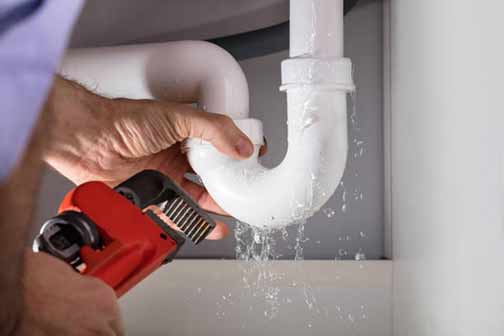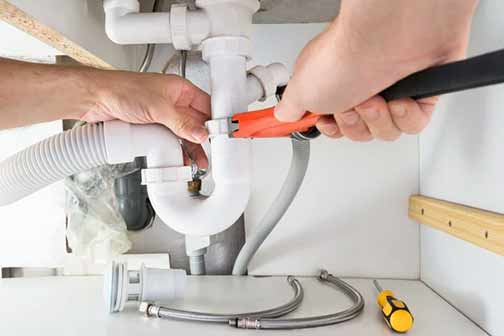
Plumbing issues are a common concern for homeowners and can range from minor leaks to significant pipe damage. Understanding the basics of plumbing leaks and pipe replacement is crucial in making informed decisions about your plumbing system.
Below we will cover the fundamental concepts of plumbing leaks and the necessity of pipe replacement, providing a solid foundation for further discussion.
Common Causes of Plumbing Leaks
Plumbing leaks can occur for various reasons, and identifying the root cause of a pipe leak is essential for effective repair or replacement. Common causes of plumbing leaks include:
- Corrosion: Over time, pipes can corrode due to chemical reactions between the pipe material and the water, leading to leaks.
- High Water Pressure: Excessive water pressure can strain pipes and cause them to crack or burst.
- Temperature Fluctuations: Rapid changes in temperature can cause pipes to expand and contract, leading to leaks.
- Tree Roots: Tree roots can grow into pipes, causing blockages and leaks.
- Poor Installation: Improperly installed pipes are more prone to leaks and other issues.
Signs That Indicate You Have a Plumbing Leak
Detecting a plumbing leak early can prevent further damage and costly repairs. Here are some common signs that indicate you may have a plumbing leak:
- Unexplained Increase in Water Bills: A sudden spike in your water bill without an apparent reason could indicate a hidden leak.
- Water Stains: Discoloration or stains on walls, ceilings, or floors can be a sign of a leak.
- Musty Odors: Persistent musty smells can indicate mold growth due to a hidden leak.
- Sound of Running Water: Hearing water running when no faucets are on can suggest a leak.
- Decreased Water Pressure: A drop in water pressure can be a sign of a leak or blockage in the pipes.
When Should You Consider Leak Repair?
Leak repair is often the first solution homeowners consider when faced with a plumbing issue. However, not all leaks can be easily repaired, and some situations may require more extensive measures.
Here are some scenarios where leak repair is a viable option:
- Minor Leaks: Small leaks, such as those caused by loose fittings or minor cracks, can often be repaired quickly and inexpensively.
- Accessible Pipes: If the leaking pipe is easily accessible, repair work can be done without significant disruption.
- Recent Installation: If the pipes were recently installed and are still in good condition, repairing the leak may be more cost-effective than replacing the entire pipe.
- Localized Damage: When the damage is confined to a specific area, repairing the leak can be a practical solution.

When Is Pipe Replacement the Better Option?
While leak repair can be effective in many cases, there are situations where pipe replacement is the better option. Here are some instances where replacing the pipe is recommended:
- Extensive Corrosion: If the pipes are heavily corroded, replacing them can prevent future leaks and improve water quality.
- Frequent Leaks: Repeated leaks in the same area indicate that the pipes are deteriorating and need to be replaced.
- Old Plumbing System: Older plumbing systems may require replacement to ensure reliability and compliance with modern standards.
- Significant Damage: If the pipes have sustained significant damage, such as from freezing or tree roots, replacement is often the best solution.
- Renovation Projects: During home renovations, replacing old pipes can be a proactive measure to avoid future plumbing issues.
Cost Considerations for Leak Repair and Pipe Replacement
Cost is a significant factor in deciding between leak repair and pipe replacement. Understanding the financial implications of each option can help you make an informed decision. Here are some cost considerations:
- Leak Repair Costs: The cost of repairing a leak can vary depending on the severity of the leak, the accessibility of the pipes, and the materials required. Minor repairs are generally less expensive, while more complex repairs can be costly.
- Pipe Replacement Costs: Replacing pipes is typically more expensive than repairing leaks, especially if extensive work is required. The cost will depend on the length of the pipe, the type of material used, and labor costs.
- Long-Term Savings: While pipe replacement may have a higher upfront cost, it can lead to long-term savings by reducing the likelihood of future leaks and improving water efficiency.
Environmental Impact of Leak Repair and Pipe Replacement
Environmental considerations are increasingly important in home maintenance decisions. Both leak repair and pipe replacement have environmental implications that should be considered:
- Water Conservation: Repairing leaks promptly can conserve water and reduce waste, contributing to environmental sustainability.
- Material Waste: Replacing pipes generates more waste than repairing leaks. However, modern materials used in pipe replacement, such as PEX, are more durable and environmentally friendly.
- Energy Efficiency: Newer plumbing systems are often more energy-efficient, reducing the overall environmental impact of your home.
Choosing the Right Professional for the Job
Whether you opt for leak repair or pipe replacement, choosing the right professional is crucial for ensuring quality work. Here are some tips for selecting a reliable plumber:
- Experience and Expertise: Look for a plumber with extensive experience and expertise in handling similar issues.
- Licensing and Certification: Ensure the plumber is licensed and certified to perform plumbing work in your area.
- References and Reviews: Check references and read reviews from previous customers to gauge the plumber’s reputation.
- Transparent Pricing: Choose a plumber who provides transparent pricing and detailed estimates for the work.
Preventive Measures to Avoid Future Plumbing Issues
Taking preventive measures can help you avoid future plumbing issues and extend the lifespan of your plumbing system. Here are some tips for maintaining your plumbing:
- Regular Inspections: Schedule regular inspections with a professional plumber to identify and address potential issues early.
- Water Pressure Regulation: Install a pressure regulator to maintain optimal water pressure and prevent strain on your pipes.
- Insulate Pipes: Insulate pipes in unheated areas to prevent freezing and burst pipe emergencies during cold weather.
- Proper Disposal: Avoid disposing of grease, oil, and other harmful substances down the drain to prevent clogs and damage.
Conclusion: Making the Right Decision for Your Plumbing
Deciding between leak repair and pipe replacement requires careful consideration of various factors, including the severity of the issue, the condition of your plumbing system, and cost considerations. By understanding the basics of plumbing leaks and pipe replacement, recognizing the signs of a leak, and evaluating the pros and cons of each option, you can make an informed decision that ensures the longevity and reliability of your plumbing system.
Additionally, choosing a qualified local plumber and implementing preventive measures can help you avoid future plumbing issues and maintain a healthy home environment.

